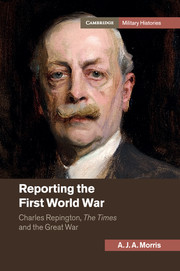Soldiers and military/political issues
Adams, R. J. Q. and Poirier, P. P. The Conscription Controversy in Great Britain, 1900–18 (1987)
Beckett, Ian F. W. The Army and the Curragh Incident 1914, Army Records Society (Stroud, 1986)
Beckett, Ian and Simpson, Keith (eds.). A Nation in Arms (Manchester, 1985)
Bond, Brian. The Victorian Army and the Staff College (1972)
Bond, Brian. Liddell Hart, 2 vols. (1977)
Bond, Brian (ed.). The First World War and British Military History (Oxford, 1991)
Bond, Brian et al., Look to your Front: Studies in the First World War by the British Commission for Military History (Staplehurst, 1999)
Callwell, C. E. Stray Recollections, 2 vols. (1923)
Cassar, George H. Kitchener’s War: British Strategy from 1914 to 1916 (Washington, DC, 2004)
Cassar, George H. The Tragedy of Sir John French (Newark, DE, 1985)
Dockrill, Michael and French, David (eds.). British Policy During the First World War (1996)
Dunlop, J. K. The Development of the British Army 1899–1914 (1938)
French, David. British Economic and Strategic Planning 1905–15 (1982)
French, David. British Strategy and War Aims 1914–1916 (1986)
Gooch, John. The Plans of War: The General Staff and British Military Strategy (1974)
Gooch, John. The Prospect of War (1981)
Guinn, Paul. British Strategy and Politics, 1914–1918 (Oxford, 1965)
Hamer, W. S. The British Army: Civil–Military Relations 1889–1905 (Oxford, 1970)
Harris, J. P. Douglas Haig and the First World War Cambridge, 2008)
Holmes, Richard. The Little Field Marshal: A Life of Sir John French (1981)
Howard, Michael. The Continental Commitment (1972)
Jeffery, Keith. Field Marshal Sir Henry Wilson: A Political Soldier (Oxford, 2006)
Keegan, John. The Mask of Command (1987)
Paul, Kennedy (ed.). The War Plans of the Great Powers, 1880–1914 (1979)
Lee, John. A Soldier’s Life: General Sir Ian Hamilton, 1853–1947 (2000)
Luvaas, Jay. The Education of an Army (1965)
Maurice, Nancy (ed.). The Maurice Case (Barnsley, 1972)
Mead, Gary. The Good Soldier: The Biography of Douglas Haig (2007)
Ombrain, Nicholas d’. War Machinery and High Policy, 1902–1914 (Oxford, 1973)
Philpott, William. Anglo-French Relations and Strategy on the Western Front 1914–1918 (1996)
Philpott, William. Bloody Victory: The Sacrifice on the Somme (2009)
Sheffield, Gary. Forgotten Victory: The First World War, Myths and Realities (2001)
Sheffield, Gary and Bourne, John (eds.). Douglas Haig: War Diaries and Letters 1914–18 (2005)
Simkins, Peter. Kitchener’s Army: The Raising of the New Armies, 1914–16 (Manchester, 1988)
Spiers, Edward M. The Late Victorian Army, 1868–1902 (Manchester, 1992)
Strachan, Huw. The Politics of the British Army (Oxford, 1997)
Williams, Rhodri. Defending the Empire: The Conservative Party and British Defence Policy, 1899–1915 (New Haven, CN, 1991)
Williamson, S. R. Jnr. The Politics of Grand Strategy (Cambridge, MA, 1969)
Wilson, Trevor. The Myriad Faces of War (Cambridge, 1988)
Woodward, D. R. Lloyd George and the Generals (Newark, DE, 1983)





